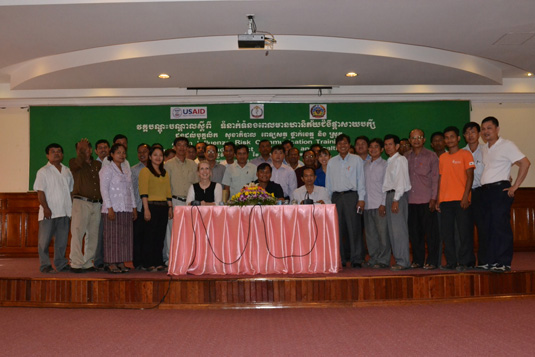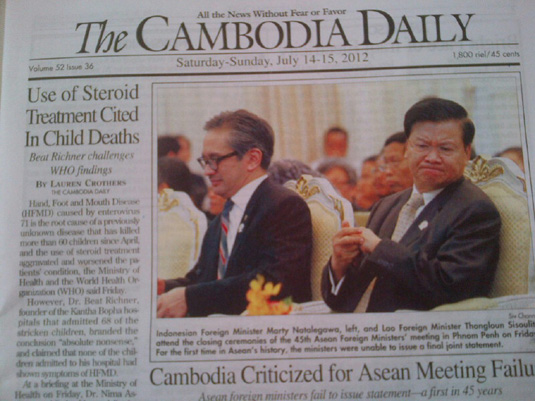
|

|
|
<< MID-BCC home page Blog Home ArchiveBy MonthJuly 2012 (2)June 2012 (1)May 2012 (3)April 2012 (5)March 2012 (1)By CountryCambodia (4)Lao PDR (4)Malaysia (1)Mozambique (1)Vietnam (2)By ProjectMID-BCC (9)PREVENT Project (3)
|
High Risk Communication Training in Battambang, CambodiaBy Dee Bennett July 20, 2012 MID-BCC Project is conducting a series of risk communication training for animal and human health district and provincial providers in four provinces in Cambodia. Dee Bennett, MID-BCC Project Director, and Trudy Farnum, Operations Manager, visited the Battambang Province training held on 17-19 July. They traveled from Siem Reap and Phnom Penh, respectively, and met with Tongngy Kaing, MID-BCC's program consultant, where they reviewed logistics as well as observed the training. Following is a blog by Dee on observations and overview of this training activity. Battambang, CambodiaBattambang is a bustling and booming town. Construction is everywhere and semis roll through town at all times of the day and night – I can hear them rolling through town because we are on a major through road and the drivers sound their airhorns at 2 a.m. as if it were 2 p.m. Unlike Siem Reap which is charming...and based on a tourist economy...there is energy and a commerce-feel in Battambang.
When we arrived in town I got out of the car to hear a Call to Prayer from the local mosque. Had to adjust....not something I'm using to hearing here. It also was the sitting for the national exams for Khmer school students. I heard a miking announcement reminding students as they return from break – "No papers. No documents on your bodies." In other words, no cheating. Several participants at the workshop have children taking the exams so they are anxious for them.
Temple near the hotel is a mixture of Hindu and Buddhist. Yes, it is disconcerting to see Buddha with Ganesh. WorkshopTongngy Kaing has done an excellent job on logistics. The hotel is new and efficient (Chinese-funded and Khmer-built) and we are based in a large conference room. It gives us room to accommodate the 38 participants plus seven trainers and our staff as well as area to break into work groups. Hotel staff is very efficient and accommodating. The workshops initial purpose was to prepare human and animal health workers on risk communication because of the new outbreaks of H5N1 virus. However, as we have developed the workshops there is additional value to what we are doing. First, these trainings have brought together – and in some cases for the first time – providers from the Department of Animal Health and Ministry of Health. Lot of emphasis here placed on that happening. These trainings are focused on communication and it is exciting to see it is not an afterthought or add-on. It is on center stage...and that's nice. This is a community-level activity. It reaches providers that are on the front lines and generally do not have access to training (especially on communication) or to current information and materials. Participants came from as far away as 130 km and represent communes and districts of XXX of people from throughout the province. And in the end there there will be experienced Khmer trainers that are equipped to do this training in other provinces and for other public health issues. When you compare these accomplishments to what USAID Forward wants to accomplish it is impressive. These trainings will lead to sustainability and it is building capacity of partners and counterparts. The worry in women-focused and gender....Not there. We should look at what keep women from participating....is it family responsibilities, being away from home, not in position of responsibility, senority? Need to see how we can ease those obstacles so more women are included. One Health and Other Health IssuesThe training session was opened by Chou Seuth, Technical Head Officer of Battambang Public Health Office, and Long Phorn, Battambang Agriculture Provincial Deputy Director. We had 17 vets from MAFF and 18 health officials from MOH. 
The concept of One Health was key in the welcoming statements by the government officials. ASEAN just met in Cambodia this past week and communication was a key focus as was One Health. Multisectoral. Etc. One Health was the buzz among the trainers because this workshop is actually doing it. The vets and health providers have been working in districts and most are familiar with H5N1 virus. Cambodia has had a resurgence the past year including the deaths of several Khmer. These deaths and outbreaks have renewed interest in H5N1 prevention – why we are here – but also underscores the need for preventative measures and plans. Before we came to Cambodia there were reports of the mysterious deaths of 60 plus Khmer children. These deaths have drawn worldwide attention as authorities have try to sort out what is causing them. There have been speculations and hypotheses among "experts" but not until the government of Cambodia with WHO makes a statement it is still up for professional opinion. (GoC and WHO did issue a statement and immediately the hospital where the majority of the children had died refuted it. And elementary schools in Phnom Penh are closed indefinitely because of HFMD.)
|
|
|
Copyright© 2011 FHI360 1825 Connecticut Avenue NW Washington, DC 20009 - 5721 
The Mekong Infectious Disease Behavior Change and Communication Project is funded by the United States Agency for International Development (USAID)/Global Health under Client Associate Award Number GHN-A-00-09-00002-00 under Leader Award (C-Change) No. GPO-A -00-07-00004-00 and managed by FHI 360. The information provided on this site is the responsibility of FHI 360 and is not official information from the U.S. Government and does not represent the views or positions of USAID or the U.S. Government. |
||


